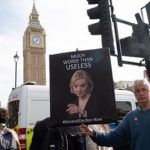Britain’s financial system is approaching a cliff edge. After stepping in to calm the market chaos that followed Kwasi Kwarteng’s mini-budget, the Bank of England has insisted it will close the £65bn emergency scheme used to smooth over the mess.
From Friday, the central bank plans to halt its rescue purchases of UK government bonds, in a market where funds managing the retirement savings of pensioners across the country still risk being dangerously burned.
It is a big gamble, to say the least, given the magnitude of the financial, economic and political bind that Britain is in.
“The good outcome is that the government and the Bank seek to, and successfully regain, investor confidence. At the moment we look some distance from that,” said one City fund manager.
.
It comes in a crunch week when both Kwarteng and the Bank’s governor, Andrew Bailey, are out of the country at the annual meetings of the International Monetary Fund in Washington. Tensions were already high before the trouble began, after Liz Truss used the Tory leadership race to throw shade on the Bank’s inflation-fighting record.
When arriving for the gathering of the world’s finance ministers and central bank chiefs – in which Britain’s mini-budget meltdown has become a central part of the show – Kwarteng was asked for his view on the end of the bond-buying lifeboat scheme this Friday.
It was a decision for the Bank, he said. But there are risks for both men in the crisis; in which the government, Bank, the finance industry, and global economic trends have all played a part.
Kwarteng’s mini-budget is widely seen as the trigger which set off a “doom loop” in bond markets last month as pension funds became snarled up in complex derivatives they had bought to guard against rising interest rates.
Schemes responsible for the money of pensioners across the UK had ploughed more than £1tn into so-called liability driven investment (LDI) funds. The schemes in question are the gold-plated defined benefit pension schemes, where the employer has promised a set level of pension each year, regardless of the fund’s performance.
Many used hedging arrangements to help ensure against shortfalls. Pensions are among the biggest buyers of government bonds, and as the value of those bonds fell, they faced demands for extra cash to cover the hedges. To raise that cash, they sold government bonds, sending the value of those assets even lower, requiring them to sell more bonds.
In the four days after Kwarteng’s ill-fated speech – before the Bank’s emergency intervention – 30-year bond yields rose by more than the annual increase in 23 out of the last 27 years. Some funds came close to the point of collapse.
The moves come as interest rates across advanced economies rise, as big central banks around the world raise borrowing costs to tackle rampant inflation unleashed by Russia’s war in Ukraine.
“What the government has managed to do is take a general rise in global interest rates and make it about their bad policy choices,” said one City banker.
Economists warn that Britain’s credibility is on the line for two things in particular: running sound public finances, and fighting inflation. “That is causing a buyer’s strike in UK assets,” said George Saravelos of Deutsche Bank.
skip past newsletter promotion
Sign up to Business Today
Free daily newsletter
Get set for the working day – we’ll point you to all the business news and analysis you need every morning
Enter your email address Enter your email address Sign upPrivacy Notice: Newsletters may contain info about charities, online ads, and content funded by outside parties. For more information see our Privacy Policy. We use Google reCaptcha to protect our website and the Google Privacy Policy and Terms of Service apply.
after newsletter promotion
.
While the central bank has the headache of trying to bring down inflation at the highest level since the 1980s, the emergency bond-buying scheme is aimed squarely at fighting financial stability risks. Investors see the ultimate cause of the tumult as the government’s “miscalibrated” tax plans, Saravelos added.
Despite this, the Bank has used less than a fifth of its potential £65bn intervention, buying up less than £10bn of UK government bonds since stepping in on 28 September.
Aiming to ensure the scheme ends as planned this week, the Bank ramped up its firepower to intervene with a promise to buy up to £10bn of bonds a day. It has also started buying index-linked gilts, securities with interest rates that move up and down with inflation. After its main bond-buying programme ends, it has said there will be a loan scheme to support markets.
Pension funds are expected to heed the Bank’s calls to bolster their finances before the Friday cliff edge, by selling more bonds to raise the tens of billions of pounds in cash buffers Threadneedle Street thinks they need. The aim will be to create big enough reserves to guard against any future rapid changes in bond markets once the Bank steps back.
However, some investors are sceptical that turbulence can be avoided entirely. Big questions still remain over the scale of the government’s borrowing plans – and therefore likely moves in bond markets to accommodate them – before Kwarteng announces his debt-cutting strategy on 31 October.
The Bank also plans to start selling UK government bonds on the same day, as it attempts to extricate itself from its quantitative easing programme with sales of £80bn planned.
This strategy is considered to be vital for tackling inflation, and Threadneedle Street will only reluctantly ditch it.
Something has to give.




